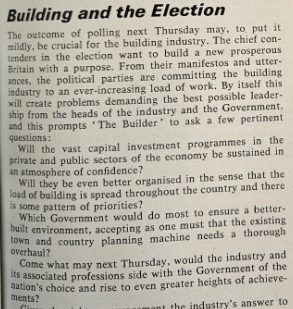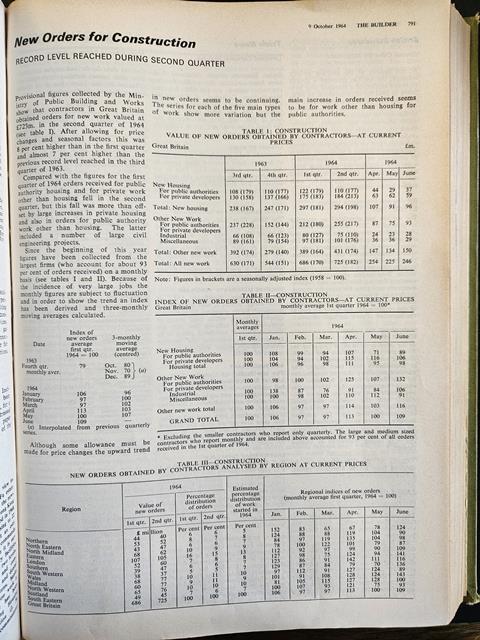As Labour stands on the brink of a historic election victory, Tom Lowe looks at how �ڶ����� covered Harold Wilson’s successful campaign 60 years ago.

The UK was at the peak of its postwar economic boom in the autumn of 1964. New orders for contractors had hit record levels in the second quarter of the year, as outlined in figures printed in The Builder in October. The country was also in the midst of a world-dominating cultural revival, with the Swinging Sixties approaching their peak.

The optimistic mood played into that autumn’s general election as voters embraced Labour leader Harold Wilson’s promise to sweep away old practices with the “white heat of revolution”. The party won a tiny majority of just four seats that year, replacing a Conservative government that had been in place for 13 years and which had recently been discredited by the Profumo affair.
Below is The Builder’s leading article for the week before the 15 October poll – and excerpts from its coverage in the weeks that followed.
Leader, 9 October 1964
�ڶ����� and the Election
The outcome of polling next Thursday may, to put it mildly, be crucial for the building industry. The chief contenders in the election want to build a new prosperous Britain with a purpose. From their manifestos and utterances, the political parties are committing the building industry to an ever-increasing load of work. By itself this will create problems demanding the best possible leadership from the heads of the industry and the government, and this prompts The Builder to ask a few pertinent questions:
Will the vast capital investment programmes in the private and public sectors of the economy be sustained in an atmosphere of confidence?

Will they be even better organised in the sense that the load of building is spread throughout the country and there is some pattern of priorities?
Which government would do most to ensure a better built environment, accepting as one must that the existing town and country planning machine needs a thorough overhaul?
Come what may next Thursday, would the industry and its associated professions side with the government of the nation’s choice and rise to even greater heights of achievements?
Given the right encouragement the industry’s answer to the last is short and simple - “Yes”. With the direct threat of nationalisation no longer an issue and a Socialist policy which has many common factors with that of the outgoing government, the building industry has less to fear from this election if Britain puts Labour in office. However, the million dollar question mark that hovers in the air is whether under a Labour government the British economy would remain sufficiently healthy to carry the stupendous building programmes that the politicians and the people want.
In their years of office the Conservatives have had this problem. Only in comparatively recent times, since Mr Harold Macmillan expanded the functions of the Ministry of Works and put Mr Rippon in office, have they made the right sort of effort to put the building industry at the heart of State affairs where it must be if Britain is to be an even better place to live in. There has been a proliferation of White Papers, vast empire building and Rippon development at the MOPBW; now is the time to consolidate the events of the past two years. That is why this election comes at such a crucial stage.
According to many political and financial pundits, a financial crisis is looming. Within the limits imposed by the election campaign, MR Reginald Maudling, Chancellor of the Exchequer, has conceded that all is not well, so after next Thursday we shall quickly learn the true state of affairs. Then the building industry must make its voice heard clearly for there must be no upheaval. But when most people go to the polls next week, the fortunes of the building industry will probably be furthermost from their minds.
The general economic position, housing, land prices, pensions, the cost of living: these are more likely to influence electors who have not already made their decision. The Conservatives besides pointing to immense achievements on the housing front have admitted severe problems in certain areas, promising to tackle them with renewed vigour. To some extent they have been inhibited in their argument of their case for the new Housing Act, the scope of which is not generally realised, has not had time to bite, but at least it is on the Statute Book.
The main controversy has settled over interest rates for housing and the Labour Party’s proposed Crown Land Commission and their new ‘Crownhold’ system, the sheer complication of which is bound to cause anxiety. But while the Conservatives may damn it to the ends of the earth, they ought not to lose sight of the concern that exists about the rising price of housing and land. Labour argue that if Britain can maintain a 4 per cent growth rate, their plans for housing and land and other social necessities will be possible.
But the difficulties will be immense, although to be fair, Mr Michael Stewart, Labour’s housing spokesman, acknowledges their existence. But, he and others say, someone must make an effort somewhere. There have even been strong hints of house price control. These and other points are more fully developed in an article from a Special Correspondent on page 771.
The sheer lack of having the machinery of government at their disposal must place some limitation upon the extent to which Labour can elaborate their Crown Land Commission proposals, but a careful study of all they have had to say leaves so many doubts remaining that it is practically impossible to visualise it achieving its main purpose. On the other hand, the Conservatives are apt to be too complacent about land and house prices; all their efforts to influence or restrain the cost of purchase have so far failed. They reveal an almost pathetic helplessness to deal with a situation on which public opinion feels deeply. The general controversy on housing only goes to stress the vital necessity of increasing the total stock of houses.
Labour take the view that we can spend all the time we like upon improving building methods, bettering building output and productivity per worker, developing new techniques and industrialised building but that in the end the net result is that the price of land mops it all up because the government have failed to give themselves the machinery with which to control it. But Labour have, generally speaking. failed to distinguish between high prices for land and high profits and the position has been reached where a decision to tax these profits would be acceptable to most people while Conservatives have steadfastly refused to do so until they are certain that it would improve the overall housing situation.
Undoubtedly the public sector of building would benefit most from a move towards land price control, but on the housing front what seems more necessary than anything is that private enterprise must be launched into building for letting with a vigour approaching that with which it is now building for sale. Would the Crown Land Commission help in this direction? It is doubtful, but here again it is so difficult to assess to what extent Labour would encourage private enterprise in such a venture.
Sir Keith Joseph’s contention that the release of more land and the building of more houses can be the only course is an easy way out. �ڶ����� on virgin land is cheaper, quicker. But there is a physical limit to such a policy. Does not so much of Britain need rebuilding with something other than offices? On other aspects of policy, the Conservatives will need to be galvanised into action. if they are given a further mandate. They have gone through their campaign without revealing their ideas on housing subsidies, what further action they will take on the Buchanan Report, how the machinery of government, nationally and regionally, will be redesigned to ensure coordination, and what further steps they would be willing to take to prevent exploitation of tenants in areas of high housing shortage. There is a lack of decisiveness in many spheres; too many reports are in the offing.
So much of the political controversy stirred by this election surrounds factors which will only be tackled effectively if the building industry does its job. The manifestos of the three main parties admit utter dependency upon the productivity of this great industry. Anyone with the industry at heart must admit that building looks set for a period of unequalled prosperity. Certain important plans for the industry are now nearing fruition. On balance, it would be preferable if the partnership by consent were not dissolved and these plans allowed to reach fulfilment. But whatever happens the industry must not change its progressive frame of mind.

Leader, 23 October 1964
�ڶ����� and the New Government
There can be nothing but disappointment that the new Minister of Public �ڶ����� and Works, Mr Charles Pannell, has not been accorded Cabinet status in the administration formed by Mr Wilson. Yet the reason for the exclusion is plain. The Prime Minister has all along expressed a fervent desire to modernise the machinery of government, and in order to fulfil this ambition, new Cabinet posts have been created at the expense of others.

This downgrading of the office will entail an even greater test of Mr Pannell’s qualities. Putting politics aside, and there has been an overdose of them, we welcome Mr Pannell to office. He has a reputation for plain speaking and as the Labour government have such a small majority in Parliament, this attribute should stand him in good stead.
The manifesto upon which his Party fought the election showed that like their opponents they are relying upon the support of the building industry. Whether one wanted it or not, we now have a Labour g overnment and they deserve support until such time as they have shown themselves unworthy of it.
One of Mr Pannell’s first tasks will be to ensure that building is not used as an economic regulator. It took the Conservative government far too long to realise the unfortunate consequences of stop-go-stop and they have now paid the penalty clause. But some changes must be expected. Although one does not want to anticipate regulations and priorities at this stage, it seems likely that they will come, although not on any sweeping scale.
A certain amount of regulation might not be a bad thing in order to sustain the industry on an even keel. It is extremely heavily loaded with work and if pursued with tactful moderation some regulation could have a useful effect. Mr Rippon at times left the impression that he would not have minded adopting such a policy except that it would have been political dynamite for a Conservative government.
The surprising choice of Mr Richard Crossman as Minister of Housing foreshadows a vigorous housing drive, while it is only to be expected that the IDC system for factory building will be tightened up even more and possibly extended to offices. But there is one piece of legislation in the pipeline that ought not to be delayed - the Bill to give effect to the National �ڶ����� Code.
There appears to be no reason whatever why Mr Pannell cannot take this measure through, for it ought to arouse little contention. The school and hospital building programmes will undoubtedly be reviewed so Mr. Pannell must quickly assess what strains the industry can continue to bear. For the moment any fiddling about with the National �ڶ����� Agency ought to be given low priority.
Mr FT Willey’s appointment as Minister of Land and Natural Resources, where it seems he will be responsible for all that Lord Silkin’s Ministry of Town and Country Planning embraced in 1945, means some overlapping with Mr Crossman’s Ministry of Housing. We must await clarification of the two Ministers’ responsibilities for land and for planning before useful comment can be made, other than that we would think that land use is something that should stay with Housing as being the Ministry closest in touch with local government.
Leader, 30 October 1964
Labour’s Team for �ڶ�����
The first session of the new Parliament begins on Tuesday. and the Queen’s Speech is expected to reveal the Labour government’s determination to press ahead, in spite of their narrow majority, with their controversial proposals for a Land Commission, the repeal of the Rent Act and its replacement by a new system for fixing and controlling rents, and the nationalisation of steel. They might also, as the Conservatives intended, bring in a Bill to deal with mergers and monopolies, and there seems no reason why they should not introduce the promised legislation on the national building code.
The Land Commission legislation will be taken through Parliament by Mr FT Willey, the Minister of Land and Natural Resources, a man who is largely an unknown quantity, particularly on this type of subject. A barrister, he has hitherto specialised in education and agriculture. During the almost unprecedented upheaval that Mr Harold Wilson has carried out in Whitehall, the exact nature of Mr Willey’s responsibilities and their relationship to those of the Ministers for Housing and Local Government and for Economic Affairs have not yet fully penetrated to the light of day, although the clarification that must be given should materialise in Parliament next week.
It was at first thought that Mr Willey would take over the town and country planning functions of the Minister of Housing, but that does not now appear to be the case. It seems that he will assume responsibility for national parks and other amenity matters, mineral rights and water, which is also to be nationalised. The main task will be to establish the Land Commission and the appointment of the experienced Lord Mitchison, QC, to be Parliamentary Secretary in the Lords is taken as ample evidence of Labour’s intention to proceed with their proposal. As Mr Gilbert Mitchison, the new life peer was the Opposition’s chief spokesman on Housing at the time of the passage of the Rent Act by Mr Henry Brooke, and he will also speak on housing in the Lords. It is, however, highly probable that Mr Crossman will be brought in for the Commons battle on land.
The Parliamentary Secretary in the Commons to the Ministry of Land and Natural Resources will be Mr Arthur Skeffington, who represents Hayes and Harlington. He has taken a prominent part in debates on housing planning and amenity matters. He chaired the Labour Party inquiry into the building industry from which was drawn up the policy statement detailed in ‘The Builder’ a few weeks ago.
As briefly mentioned last week, the new Parliamentary Secretary to the MOPBW, is Miss Jennie Lee. The widow of Mr Aneurin Bevan, she is to chair a departmental committee dealing with the arts, cultural activities, amenities and some aspects of leisure, Mr James MacColl who becomes Parliamentary Secretary to the Ministry of Housing and Local Government, has been chosen on the strength of his specialisation in local government.
Mr Richard Marsh, the new Parliamentary Secretary to the Ministry of Labour, will be specifically responsible for industrial training. The new Minister of Transport is a Scot, Mr Tom Fraser, Mr HJ Boyden, who in the last session took particular interest in the building industry, is one of the Under-Secretaries to the Department of Education and Science. Mr Pannell has chosen as his Parliamentary Private Secretary, Mr Terence Boston, who came into the House following a by-election earlier this year, and supplied evidence when Labour members made an issue of the shortage of bricks.
Here, then, is the team; the building industry awaits with interest its proposals for action.
More from the archives:
>> Nelson’s Column runs out of money, 1843-44
>> The clearance of London’s worst slum, 1843-46
>> The construction of the Palace of Westminster, 1847
>> Benjamin Disraeli’s proposal to hang architects, 1847
>> The Crystal Palace’s leaking roof, 1851
>> Cleaning up the Great Stink, 1858
>> Setbacks on the world’s first underground railway, 1860
>> The opening of Clifton Suspension Bridge, 1864
>> Replacing Old Smithfield Market, 1864-68
>> Alternative designs for Manchester Town Hall, 1868
>> The construction of the Forth Bridge, 1873-90
>> The demolition of Northumberland House, 1874
>> Dodging falling bricks at the Natural History Museum construction site, 1876
>> An alternative proposal for Tower Bridge, 1878
>> The Tay Bridge disaster, 1879
>> �ڶ����� in Bombay, 1879 - 1892
>> Cologne Cathedral’s topping out ceremony, 1880
>> Britain’s dim view of the Eiffel Tower, 1886-89
>> First proposals for the Glasgow Subway, 1887
>> The construction of Westminster Cathedral, 1895-1902
>> Westminster’s unbuilt gothic skyscraper 1904
>> The great San Francisco earthquake, 1906
>> The construction of New York’s Woolworth �ڶ�����, 1911-13
>> The First World War breaks out, 1914
>> The Great War drags on, 1915-16
>> London’s first air raids, 1918
>> The Chrysler �ڶ����� and the Empire State �ڶ�����, 1930
>> The Daily Express �ڶ�����, 1932
>> Outbreak of the Second World War, 1939
>> Britain celebrates victory in Europe, 1945
>> How buildings were affected by the atomic bombs dropped on Japan, 1946
>> Rebuilding the House of Commons chamber, 1945
>> Planning the postwar New Towns, 1945-46
>> The Festival of Britain, 1951



























No comments yet